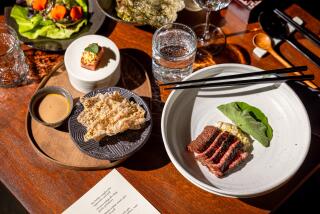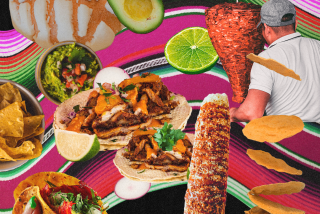There’s a waiter in my soup
- Share via
Once upon a time, waiters didn’t wait for the main course to appear, and for us to take our first bites, to appear at our tables and demand, “Is everything all right?” But now the practice is so firmly part of the American dining experience that the question is asked every day, from breakfast to dinner, from truck stop to gastronomic temple, in 48 contiguous states, along with Hawaii, Alaska and Puerto Rico.
“Yes,” we mumble through half-chewed food.
But since they asked, No. Aaack. Water! Aaack. Excuse me while I choke. Ptew.
As I was saying: No. Oh, waiters of America, why do you wait until our mouths are full or, barring that, until your customers are finally forehead to forehead, finally absorbed in some riveting bit of gossip, to barge up and demand, “Is everything all right?”
You cannot possibly want to know the answer. You rarely ask the question when things aren’t all right, when we are hoping for the wine list, or some bread, or to be moved away from the couple in the middle of a really excruciating public breakup. In fact, in these instances we become invisible. You have perfected the art of looking right through us.
Rather, we are only asked to confirm our contentedness when everything is conspicuously all right. As such, “Is everything all right?” is less a question than an interruption, when our enjoyment of the meal is suddenly broken in a naked bid for appreciation.
The conviction seems to be that service that insists on calling attention to itself is better than discreet caretaking.
Shoring up egos
It’s not that there’s anything wrong with fishing for compliments. We may be the best tippers in the Western world, but you waiters of America still seem to feel underappreciated. Why else do you, given the chance, insist that you are really actors or postdocs at Pepperdine University?
If, in fact, “Is everything all right?” really is a bid for validation, then maybe we need to invent a Waiters of America Day. On this day, we the nation would stop to ponder what a rare captain of industry it would be who could make it slinging beer through one Friday night shift at Hooters, or learn the names of the cheeses on a daily changing platter at an upscale French place.
There could be a reality program in which Donald Trump has to deal with no-shows and walk-ins, cope with snotty chefs, rude customers and every fad diet to have been on a bestseller list. Better yet, we could dock his pay when customers run out on their checks or busboys break glasses.
Maybe not.
Still, waiters of America, if it’s appreciation you want, why do you try to choke us with a trick question right after you bring us our food?
Do I smell a corporate plot? Used as it is, the question is just nonsensical enough to have been scripted. It’s got the ring of one of the platitudes that have so slowly but surely eroded American charm: Have a nice day. How am I driving? Your call is important to us. Is everything all right?
If memory serves, “Have a nice day” was universalized by the telephone company in a bid to de-Lily Tomlinize America’s operators. “Your call is important to us” was an airline gambit. Taxi services launched the driving inquiry. Who knows what restaurant first started Is-Everything-All-Right-ing us, but it’s a safe bet that it was a chain-owned one.
Supposedly it was all done in the name of good service: consistency, customer satisfaction and all that. However, as these corporate puppeteers hijacked our most basic daily exchanges, they have slowly but surely rendered conversation in America ridiculous. “The number is unlisted. Have a nice day.” What was once a solicitous parting is now a passable curse. Have a nice day yourself.
Phony blandishments
We customers must act. You know how Democrats want to “take back America”? We must take back conversation. The next time we encounter a noxious platitude, we should summon our inner schoolteachers. “If you have to ask me how you’re driving, you should not be behind the wheel.” “If my call is important, why don’t you answer it?” “Everything was all right until you so rudely interrupted.”
The war on phony blandishments will not be won with a “no.” In fact, a “no” might just make it worse: Waiters might want to extend the interruption into a discussion.
Recently during a visit to New York, I experimented with “yes.” When the hostess of La Cote Basque stalked toward my table in vivid “Are you all right?” mode, I snapped “Yes” before she got the question out.
She leered before retreating to a high stool at the maitre d’ podium. “You did the right thing,” said my companion. We then couldn’t remember what we had been talking about.
On the bright side, she didn’t bother us again.
More to Read
Eat your way across L.A.
Get our weekly Tasting Notes newsletter for reviews, news and more.
You may occasionally receive promotional content from the Los Angeles Times.










